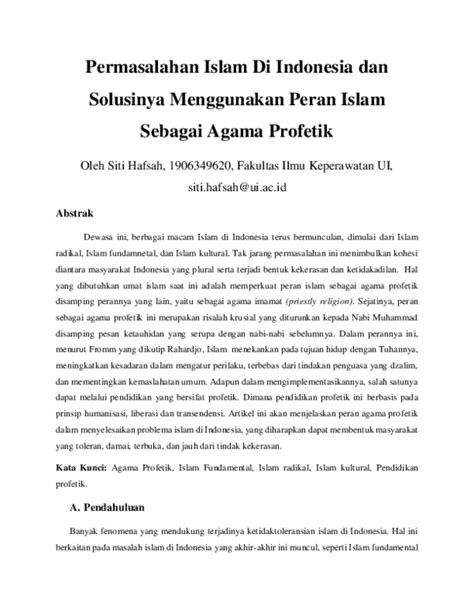Religious Issues in Indonesia: A Complex Tapestry and Potential Solutions
Indonesia, the world's largest Muslim-majority nation, boasts a vibrant tapestry of religious diversity. However, this richness is interwoven with complex challenges. Understanding these religious issues and exploring potential solutions requires a nuanced approach, acknowledging the historical context and the multifaceted nature of the problems.
The Landscape of Religious Issues in Indonesia
Indonesia's constitution guarantees freedom of religion, but in practice, this freedom is often tested. Several key issues emerge consistently:
-
Religious Intolerance: Acts of intolerance, ranging from discrimination to violence, against religious minorities (Christians, Hindus, Buddhists, etc.) remain a concerning reality. This can manifest in various ways, including restrictions on religious practices, hate speech, and even attacks on places of worship. The underlying causes are often complex and intertwined with social, political, and economic factors.
-
Radicalization: The rise of extremist groups poses a significant threat to national security and social harmony. These groups often exploit existing social grievances and promote intolerant ideologies, leading to violence and conflict. Combating this requires addressing the root causes of radicalization, including poverty, injustice, and a lack of education.
-
Interfaith Conflicts: Disputes over land ownership, religious symbols, or interpretations of religious law can escalate into conflicts between different religious communities. These conflicts often highlight the need for improved interfaith dialogue and understanding.
-
Regulation of Religious Practices: The government's role in regulating religious practices remains a sensitive issue. While regulations are intended to maintain order and prevent extremism, they can sometimes be perceived as discriminatory or overly restrictive. Finding a balance between maintaining public order and protecting religious freedom is crucial.
-
The Role of Social Media: The spread of misinformation and hate speech through social media platforms exacerbates religious tensions. This requires a multi-pronged approach involving media literacy initiatives, stronger content moderation policies, and promoting responsible online behavior.
Potential Solutions: A Multifaceted Approach
Addressing Indonesia's religious issues demands a comprehensive strategy that tackles the problem from multiple angles:
-
Strengthening Interfaith Dialogue: Promoting dialogue and understanding between different religious communities is paramount. This involves creating platforms for interfaith discussions, educational programs, and community-based initiatives that foster mutual respect and cooperation.
-
Enhancing Education: Education plays a crucial role in fostering religious tolerance and understanding. Curriculum reforms that promote religious pluralism and critical thinking are essential. This includes emphasizing the common values shared by different faiths and debunking misconceptions and stereotypes.
-
Improving Law Enforcement: Effective law enforcement is crucial in preventing and addressing acts of religious intolerance and violence. This requires training law enforcement officials on sensitive handling of religious conflicts and ensuring that perpetrators are held accountable for their actions.
-
Empowering Civil Society Organizations: Civil society organizations play a vital role in promoting religious tolerance and mediating conflicts. Supporting these organizations through funding and capacity building is essential.
-
Promoting Media Literacy: Combating the spread of misinformation and hate speech requires increasing media literacy among the population. This includes developing critical thinking skills and teaching individuals how to identify and avoid fake news.
-
Addressing Socioeconomic Factors: Poverty, inequality, and a lack of opportunities are often underlying factors contributing to religious intolerance and radicalization. Addressing these issues through economic development and social justice initiatives is crucial for creating a more inclusive and peaceful society.
The challenges surrounding religious issues in Indonesia are complex and require sustained effort and collaboration from all stakeholders – the government, religious leaders, civil society, and individuals. By working together, Indonesia can build a society where religious diversity is celebrated and where all citizens can live in peace and harmony.
